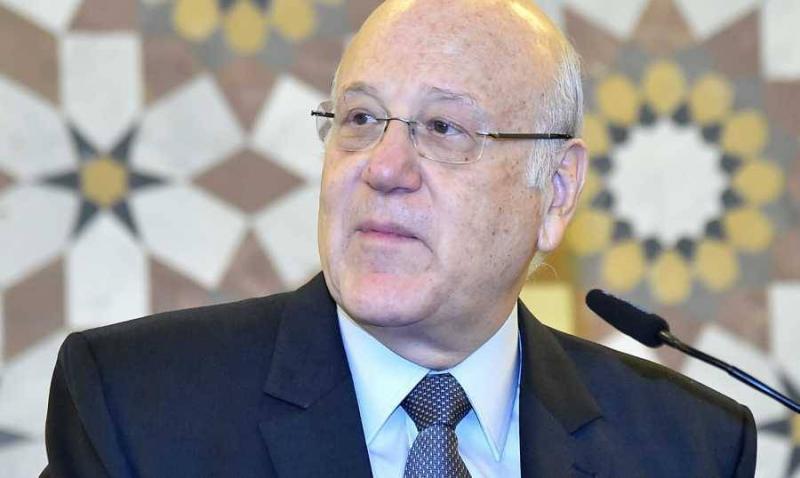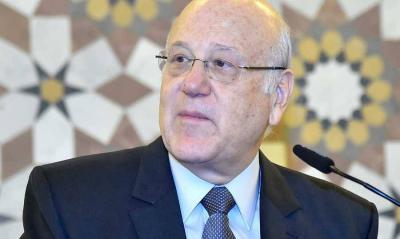From the high balcony of the Platinum building overlooking the sea, caretaker Prime Minister Najib Mikati contemplates the Lebanese scene and its complexities, attempting to strike a balance and avoid its pitfalls. While some believe that Mikati is the biggest beneficiary of the current lack of a president, as it allows him to maneuver freely both domestically and abroad, he assures his visitors that he is eagerly awaiting the moment he can be freed from the burdens of power, stating, "the responsibility at this stage has become heavy and exhausting." He explains that he sometimes personally takes on the exceptional administrative decisions necessary to manage state affairs due to the current inability to convene the Cabinet.
Based on a policy of rounding corners and addressing concerns, Mikati insists that he is not planning to call for a government session as long as there is no urgent necessity, saying, "I don't want a free headache; the problems we are facing are enough." He mentions that he will currently rely on activating ministerial committees and enhancing communication with ministers to address people's issues and concerns.
Mikati praises Hezbollah's conduct in the parliamentary and ministerial councils, noting that the party is cooperative and facilitative regarding the reforms requested by the IMF, as evidenced by discussions in Parliament, while the Lebanese Forces are the ones acting negatively in this file. He points out that to see the difference in approaches between the two parties, one only needs to listen to MPs George Adwan and Ali Fayad.
He commends Hezbollah ministers Ali Hamieh and Mustafa Beyram for being active and respectful of the Prime Minister's position. He expresses satisfaction with most ministers' work, stating, "The Deputy Prime Minister Saadeh Al-Shami is excellent and decent, but how can he face the wolves of the political center?" He gives examples: "The Minister of Social Affairs Héctor Hajjar is hardworking, the Minister of Health is very organized and would be better suited to be a minister in Switzerland, the Minister of Tourism is good, and others as well, but the Minister of Energy, Walid Fayad, is the one who tortures me."
Although Mikati parted ways with President Michel Aoun at the end of his mandate over a political misunderstanding, he requested Aoun's new home phone number in Rabieh "because I want to check on his well-being and greet him regardless of the political disagreement." When asked about his opinion on the head of the Free Patriotic Movement, MP Gibran Bassil, regarding his political experience with him, he replies: "Gibran is active, but his problem is that he does not know how to negotiate and he cannot 'give and take.'"
Despite the politically and economically troubled reality, Mikati considers the solution not impossible, asserting, "Lebanon will not vanish but will remain and eventually emerge from the tunnel." He points out that travel to Lebanon is "booming" during the holidays, adding, "We only need a minimum of political stability and to finalize the agreement with the IMF, after which the economic cycle will automatically activate, leading to improvements, especially since our people are, by nature, vibrant and do not surrender."
Mikati expresses his deep regret over the populism adopted by some MPs and blocs in handling vital files, stating that this populism clearly emerged during the discussion of the capital control law, "so they have only approved one item in this essential law after all the sessions held so far, because without it, there can be no complete agreement with the IMF and no international aid."
Regarding the presidential election, Mikati notes that he supports the election of Sleiman Frangieh for two reasons: the first is personal and political loyalty, recounting how during one of the mandatory parliamentary consultation rounds in President Emile Lahoud's tenure, Lahoud asked Frangieh who he would propose for the premiership. Frangieh replied: Najib Mikati. Here, one of the northern MPs accompanying Frangieh intervened, suggesting that Rustom Ghazaleh demanded they name another candidate, prompting Frangieh to become furious and insist on naming him.
He continues: "The second reason that drives me to support his candidacy is the importance of northern unity since we are from the same region, if not the same family, and I care about keeping our relations strong." Mikati adds: "If we continue to flounder in our crises and the doors to solutions remain closed, perhaps the Parliament should consider dissolving itself and going to new early legislative elections to break this vicious cycle the country is trapped in."
Regarding the fate of the Iranian fuel grant, Mikati clarifies that he requested a law firm to brief him on the implications of accepting the grant from a legal perspective in light of the sanctions imposed on Iran, "It informed me that accepting it could have repercussions for Lebanon, so I decided to directly address the Americans to inquire about their actual position to avoid causing any harm to the country."
Mikati reveals that during his participation in the climate conference in Egypt, he met Saudi Crown Prince Mohammed bin Salman, "but I did not announce the meeting because it was brief and limited to exchanging pleasantries." He notes that he nearly withdrew from one of the conference sessions upon discovering the presence of an Israeli minister, "but I did not do so in consideration of the host country's president, Abdel Fattah el-Sisi," reaffirming his complete rejection of any form of normalization, "I, Najib Mikati, cannot shake hands with an Israeli no matter the cost."




